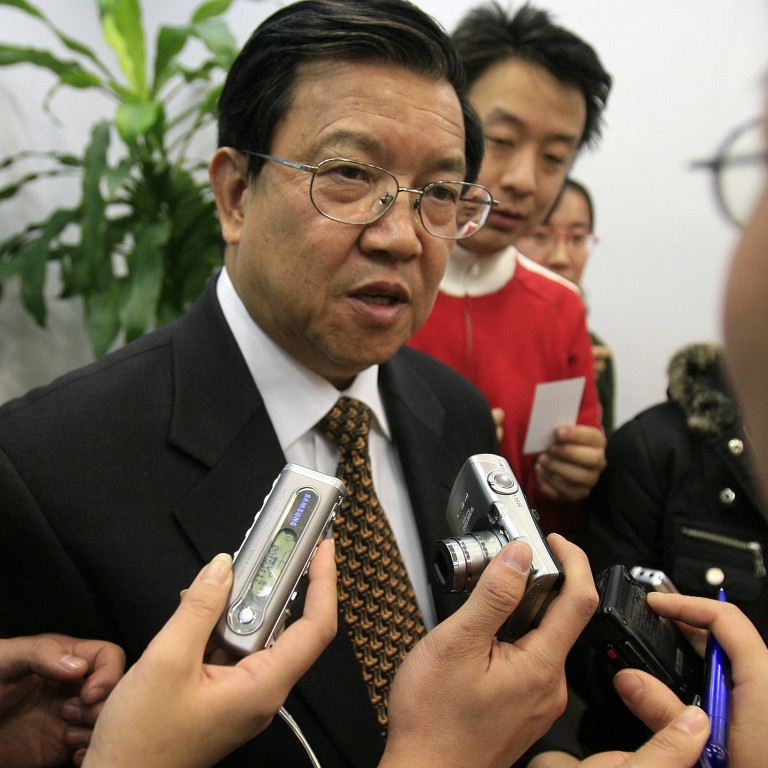
Coronavirus: China risks being left out of new global economic order, Beijing’s former trade chief warns
- Long Yongtu, who led China’s negotiations to enter the World Trade Organisation, has warned Beijing to be alert to the risk of geopolitical isolation
- His voice adds to a chorus of warnings from former officials and advisers about China’s position in the post-coronavirus world
China could face isolation from the global economic order post-coronavirus, warned Beijing’s former chief trade negotiator Long Yongtu, who shepherded the country into the World Trade Organisation in 2001.
As more countries follow the United States in criticising China for its handling of the virus, doubts are growing as to whether Washington and its allies will try to exclude Beijing from a new international economic order, a theory being labelled by some Chinese experts as “de-sinicisation”.
Such a process would pose a protracted economic and diplomatic challenge to China in the years ahead, even though it has effectively declared victory over the virus within its borders.
China is also an important participant in globalisation, so when somebody begins to talk about ‘deglobalisation’, there are also voices about ‘de-sinicisation’
“China is also an important participant in globalisation, so when somebody begins to talk about ‘deglobalisation’, there are also voices about ‘de-sinicisation.’ Of course, we need to be highly wary of that,” said Long, the former vice-minister of foreign trade and point man during China’s 15-year talks that ended in accession to the World Trade Organisation in 2001.
“After the pandemic, there will be significant changes in international trade, investment and industrial chains. The epidemic has caused huge damage to globalisation,” Long added, urging Chinese companies to increase the pace of their international expansion.
Long made the comments on Saturday at an online forum organised by ifeng.com, the Shanghai Advanced Institute of Finance and the National School of Development at Peking University.
We have every reason to say that an international alliance is forming that excludes China and the Chinese yuan
“We have every reason to say that an international alliance is forming that excludes China and the Chinese yuan,” said Li Yang, director of the Chinese Academy of Social Sciences’ National Institution for Finance and Development, echoing Long’s remarks at the same online conference.
“We have no other choice but to make the yuan stronger, make the yuan an international currency. Of course, on the same basis, it is also important to make China stronger.
“The trend toward ‘de-sinicisation’ has developed over a period of time and it has developed further during the pandemic. We need to pay close attention to this.”
On top of the economic pressure, the US, European Union, Australia and other countries have heaped geopolitical tension on China, calling for an independent investigation to determine the virus’ origin.
Figures within the Trump administration have implied that the outbreak leaked from a lab in Wuhan, an accusation which has been widely debunked by scientists and denied by other governments.
The trend has evoked in some quarters comparisons to the “century of humiliation” in China, a topic which is revisited with increasing regularity by nationalistic elements within the Chinese government.
China’s top decision-makers led by President Xi Jinping have called on the country to prepare for sustained and long-term changes in the external environment.
Experts expect Beijing’s international relations, particularly with regard to the US, to be an important topic in the coming national legislative gathering, known as the “two sessions,” that will start on May 22.
Speaking at a separate online forum on Friday, Shi Yinhong, an international relations professor at Renmin University and an adviser to China’s State Council, the country’s cabinet, said the pandemic was escalating the trend of US-China decoupling, both commercially and culturally.
“The disruptions to industrial chains and the drastic decline in international travel are only the most visible features,” he said last Friday at the China International Issues Forum 2020.
Despite growing international hostility towards China, Long, who in an interview with the South China Morning Post last year said the Chinese government would like US President Donald Trump to win re-election in November, remained optimistic about the long-term prospects for globalisation.
He called on China to further open up its domestic market to foreign investors and for Chinese companies pursue more mergers and acquisitions abroad, to better integrate China into the new industrial chains of multinational companies.
On Monday a new study showed that Chinese investment in America fell to its lowest level since 2009 last year.

